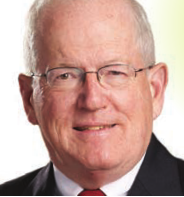Session exposed a disturbing feature of budget negotiations
Looking back at the 2021 legislative session, it is clear that it was a very different experience, especially for New Hampshire House. Certainly, it was unique for the New Hampshire Senate as well, as it met in Representatives Hall to allow social distancing, but at least senators were in the State House and had access to each other.
House members, on the other hand, met very rarely, and when they did, it was in a sports complex on Route 3 in Bedford, big enough to allow 400 chairs appropriately spaced. Committee meetings were held electronically by Zoom, a very different experience from the rooms in the Legislative Office Building in Concord.
On the one hand, Zoom allowed more people to watch the proceedings and participate if they wished. On the other, there was no opportunity to ask another person to step into the hall for some discussion or creative compromise, or to correct a misimpression either innocently or intentionally conveyed. Legislators, participating from home, did not have the feeling of camaraderie which sitting next to the same colleague day after day provides, and also missed the hallway meetings. Zoom calls and formal proceedings in a large arena tend to accentuate differences.
When considering the substance of what was accomplished, it is clear that the notable legislation passed by the 2021 Legislature was more of a conservative agenda than usual. The state budget, the primary business of the odd-numbered year session, passed, but contained many provisions thought inappropriate for a budget document, contained in the so-called “trailer bill.”
School vouchers, abortion restrictions, prohibition of teaching certain matters that are controversial and other provisions of the budget were proposals of the more right-wing members of the Republican caucus and were included, reportedly, to get their support for the budget. The budget passed with no Democratic support, and nearly universal GOP backing.
Certainly, many provisions were softened by the Senate during its process, and Governor Sununu ultimately supported measures he had not proposed, but the passage of such controversial provisions points up one disturbing feature of negotiations this year.
That feature is that, almost entirely, negotiating on the budget and provisions in the trailer bill was between factions of the same party, the Republicans. Virtually no negotiations were between the parties. In the past, moderate Democrats joined with mainstream Republicans to fashion consensus budgets and legislation. This year, the mainstream had to appease
the right wing in order to get a majority to support measures, forcing
many to vote for things they did not support or were queasy about.
New
Hampshire is not unique in this problem. A look at Congress shows
basically the same division and unity in party votes, with few
exceptions. This is not a good thing and bodes ill for the future.
Leaders
of both parties would be wellserved if they spent at least part of the
time off this summer figuring out ways to avoid this situation in future
sessions, when members will be back in the same building, eating,
talking and working side by side, and having the chance to form
coalitions working for the good of the state.
Redistricting,
a continuing task of the Legislature, still has to be done by a
committee headed by Rep. Barbara Griffin, Republican of Goffstown and
chair of the Election Law Committee. Awaiting official census data, the
committee has met to set up its processes, and how it will approach the
task of designing the 400 House seats, 24 Senate districts, five
Executive Council districts and two congressional districts. This will
be a formidable task, and many activists on both sides of the aisle, as
well as good-government advocates, will be watching the committee’s work
carefully to see if accusations of partisan Gerrymandering can be
avoided. Time will tell.
The
new state budget’s effects are still being digested by towns and
cities, due to significant effects on state aid. Governor Sununu’s
stated reluctance to make a decision about his future, whether to retire
from elective office, run for another term as governor, or challenge
Senator Hassan next year, has many other possible candidates biding
their time as well. Sununu’s appointment of aides to permanent state
jobs has many speculating that his time as governor is coming to a
close, but only he and the voters can determine that for sure. It should
be interesting to watch.
Brad Cook is a Manchester attorney. The views expressed in this column are his own. He can be reached at bradfordcook01@gmail.com.